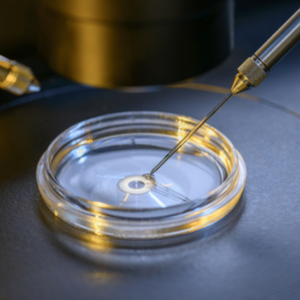Fertility Planning for Women
Moms are amazing. They hold us close when we’re babies, teach us and help us grow, and continue to support when we become adults. Even for those of us who have lost our mothers, their love continues to impact us today. Here at Newborn Advantage, we want to wish moms everywhere a very Happy Mother’s Day—including moms-to-be. As one of the best surrogacy agencies in the U.S., we understand how many women desperately want to become mothers, but are struggling with fertility problems. We love helping moms achieve their dreams of starting a family, so we’re dedicating this month’s blog to fertility planning for women. Here are three ways to boost your chances of becoming a mother:
1. IVF
 Assisted reproductive technology (ART) is one of the most popular methods for treating infertility. In ART procedures, eggs are surgically removed from a woman’s ovaries, and combined with sperm in a laboratory. Then, they are either returned to the woman’s body, or transferred to a surrogate. According to the Center for Disease Control (CDC)’s 2017 Fertility Clinic Success Rates Report, 284,385 ART cycles were performed in the United States during 2017, resulting in 68,908 live births. Approximately 1.7% of all infants born in the United States every year are conceived using ART.
Assisted reproductive technology (ART) is one of the most popular methods for treating infertility. In ART procedures, eggs are surgically removed from a woman’s ovaries, and combined with sperm in a laboratory. Then, they are either returned to the woman’s body, or transferred to a surrogate. According to the Center for Disease Control (CDC)’s 2017 Fertility Clinic Success Rates Report, 284,385 ART cycles were performed in the United States during 2017, resulting in 68,908 live births. Approximately 1.7% of all infants born in the United States every year are conceived using ART.
In virtro fertilization (IVF) is an ART procedure in which a woman’s eggs are extracted and fertilized as described above, resulting in the creation of embryos, which are transferred into the woman’s uterus through the cervix. IVF can improve female fertility for patients with the following conditions:
• Blocked or damaged fallopian tubes
• Male infertility, including decreased sperm count or sperm motility
• Ovulation disorders, such as premature ovarian failure or uterine fibroids
• Genetic disorders
• Women who have had their fallopian tubes removed
• Unexplained infertility
The American Pregnancy Association reports that the live birth rate for each IV cycle started in the U.S. is approximately:
• 41-43% for women under age 35
• 33-36% for women ages 35 to 37
• 23-27% for women ages 38 to 40
• 13-18% for women ages over 40
Live birth rates can vary depending on the fertility clinic you’re working with. If you’re interested in IVF, Newborn Advantage can help you find the best fertility clinics in your area. As gestational surrogacy specialists, we can also match you with a surrogate, who will carry the embryo created via IVF to term.
2. Egg Donation
Women are born with all the eggs they will ever have—and as a woman ages, the number of eggs she has left declines naturally. Some women may also have a diminished egg supply due to congenital, medical, surgical, or unexplained causes. These women may still be able to conceive naturally, but they will produce fewer eggs in response to fertility treatments. If diminished egg quality is preventing you from getting pregnant, egg donation can be a solution. Here are a few examples of conditions where egg donation can be helpful in boosting fertility:
• Early menopause
• Premature ovarian failure (POF)
• Poor egg quality
• History of genetic disease
• Ovaries do not respond to stimulation
• Hormonal imbalance
• Over the age of 40
Newborn Advantage can provide assistance in identifying egg donors for in vitro fertilization (IVF). We work with the best fertility agencies in the nation, to ensure you receive the healthiest eggs. Egg donors are screened for a history of birth defects or diseases, medical and social issues, physical health, psychological health, and sexually transmitted diseases. With egg donation, donors take medications to stimulate egg development and ovulation, undergo ultrasound testing and blood work, and receive the hormone HCG, before eggs are retrieved. These procedures help to optimize egg donation results.
If you’re working with an egg donor, your cycle will be synchronized with theirs, using hormonal medications. This helps to ensure your uterus lining is prepared to support the embryo. If you’re conceiving with a male partner, he will provide a semen sample the same day the eggs are retrieved from the donor. Lesbian couples, or couples with male fertility problems related to sperm, can use donated sperm. From there, the IVF cycle continues as described above.
3. Gestational Surrogate Carrier
 IVF and egg donation can be very successful in increasing your chances of getting pregnant. But what if you are unable to safely carry a child to term? If you have struggled with infertility and becoming pregnant yourself is not an option, gestational surrogacy can be a wonderful solution.
IVF and egg donation can be very successful in increasing your chances of getting pregnant. But what if you are unable to safely carry a child to term? If you have struggled with infertility and becoming pregnant yourself is not an option, gestational surrogacy can be a wonderful solution.
With gestational surrogacy, the child is not biologically related to the surrogate mother, or gestational carrier. Instead, she carries an embryo that was created via IVF. This allows you to have a child who is genetically related to one or both parents. Unlike traditional surrogacy, gestational surrogacy does not require adoption, because your baby will be genetically linked to you. Gestational surrogacy is the most common type of surgery in the U.S. today.
While gestational surrogacy has many benefits, it can be a complex arrangement. Intended parents will need to identify a healthy and qualified surrogate, complete legal contracts, navigate medical procedures and cover medical expenses for the surrogate. Working with a surrogacy agency can make it easier to match with the best surrogates, follow your state or country’s laws, and prevent legal and financial complications.
Interested in Gestational Surrogacy?
Newborn Advantage has deep experience in the surrogacy industry, and can match you with an ideal surrogate in as little as two weeks. We can also connect you with top fertility clinics and legal professionals, and manage every aspect of the surrogacy process, making it seamless for you. Please feel free to reach out to us with any questions, or for more information about surrogacy. We look forward to hearing from you!



